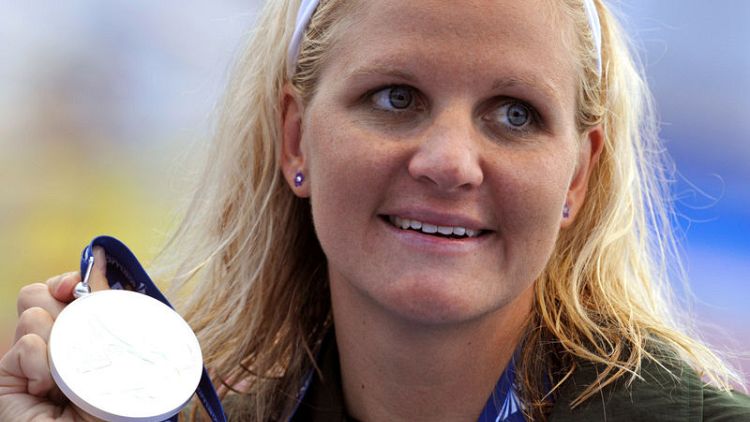By Karolos Grohmann
BUENOS AIRES (Reuters) - The reinstatement of Russia's anti-doping agency (RUSADA) last month was disappointing for some athletes but it forces Russia to deliver by year's end or face the consequences, the chair of the International Olympic Committee's Athletes' Commission said.
Olympic swimming champion Kirsty Coventry, who was recently named Zimbabwe sports minister, said she understood the frustration of athletes following the World Anti-Doping Agency's (WADA) decision last month, and admitted a rift had been created.
The WADA decision was welcomed by Coventry's commission but triggered sharp criticism from other athletes groups as well as some anti-doping agencies, who claimed WADA was not interested in punishing Russia and had put money ahead of clean athletes.
"I 100 percent understand that. I totally get it," Coventry told Reuters in an interview. "Sport is about bringing people together and creating hope and we have lost that a bit."
"We have lost a bit of respect for each other. There are different groups and we have lost the trust to have a conversation."
RUSADA was suspended three years ago after an independent WADA report outlined evidence of huge state-backed, systematic doping and cover-ups in Russian sport.
WADA had repeatedly said RUSADA would not be reinstated until it satisfied key criteria, one of which was granting access to stored urine samples at its Moscow laboratory.
But WADA lifted the ban without having been given access to the samples. Instead it put a deadline until the end of the year for RUSADA to provide access or risk facing a renewed ban.
SET TIMELINE
"The reason that I and the (athletes') commission supported it (WADA decision) is because now we have a timeline," Coventry said.
"Before, it felt like we were sitting in a stalemate. WADA had no pressure to apply. Everyone felt 'where is this going?'"
Coventry said it was now up to Russia to act and if it failed to do so sports bodies would in turn need to react.
"If we don't get what we want then we must be strong in our reaction," she said. "The ball is now in Russia's court and we have to see if they will play by the rules and hand over the data and... athletes potentially cheated out of medals can receive their medals."
"If it is not done we will have to make some tough decisions," she said.
The Russian doping scandal has already hit two Olympic Games.
Russia's track and field team was banned from the Rio de Janeiro Olympics in 2016 and the entire Russian Olympic team competed as neutrals at the 2018 Pyeongchang Winter Olympics.
Should RUSADA not deliver, the Tokyo 2020 Olympics could be affected.
"I get the mistrust, I get the difference of opinion but if we are all working towards the same goal maybe we can get that faster," she said.
"No one wants the same thing to happen in Tokyo what happened in Rio. I don't think it would be a good thing for sport in general, not just for the Games."
(Reporting by Karolos Grohmann)
